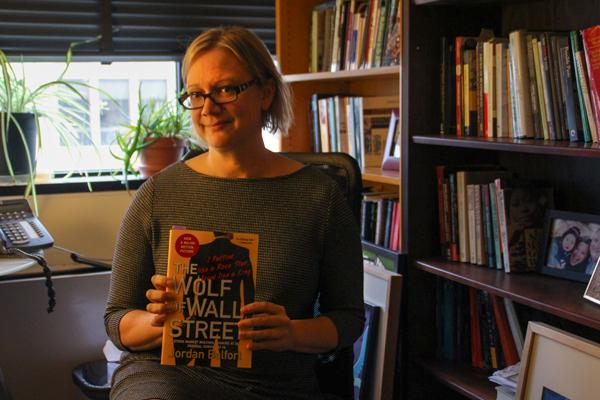The English department is planning to unveil a specialized minor for the GW School of Business students next academic year.
Faculty in the department say they have been working with business school professors to create the minor, which will require students to take at least one course that ties together English and business concepts. The minor will teach business school students skills – like writing and critical thinking – to use in their careers, English faculty said.
Marshall Alcorn, chair of the English department, said in an email the chair’s curriculum committee has developed the minor with Anna Helm, an assistant teaching professor of international business. The group’s work is building on collaboration that began under the former Associate Dean of Undergraduate Programs in the business school, Isabelle Bajeux-Besnainou.
“For as long as I have been at GW I have been told by business school faculty that business students need to know how to write, how to communicate and how to think ‘outside the box,’” Alcorn said. “The English department teaches these skills very effectively.”
Alcorn said business students often register for English courses that teach writing or theory, focus on specialized topics or feature “ethnic literatures,” which are the types of classes that will help them earn the minor.
“Many industry leaders emphasize that our graduates will have to have a well-rounded set of skills – writing, close reading, critical analysis – in order to be competitive in the job markets – both today’s job market but also tomorrow’s,” Alcorn said. “Minors like this one will help them do this.”
University spokeswoman Kurie Fitzgerald said in an email that the proposed minor is still in the planning stages.
She added that skills in written communication and critical thinking could help business students land jobs.
“Minoring in English is also a way for students to stay in touch with a love of reading and to signal a breadth of interests to potential employers,” Fitzgerald said.
Holly Dugan, curriculum chair of the English department, said in an email she piloted an introductory course for the minor in the fall of 2014, but the learning objectives have evolved since receiving input from faculty across the University.
The minor will consist of four English course electives and an upper-level capstone course, and will help students find connections between aesthetic and economic systems of value, which they can apply to their majors in business, Dugan said.
“At the risk of resorting to cliche, I think it’s a win-win for students hoping to leave GWU with both a practical major and the creative skills needed to adapt to post-baccalaureate life,” Dugan said.
She added that the English department has had some success in the past with entry-level courses geared toward business majors: Dugan has taught a course called “Literature and the Financial Imagination” for the past three years, which boasts a full enrollment of 60 students, many of whom are business majors, she said.
“It’s designed to sort of allow students to try out their other disciplinary interests through the act of reading and trying to promote reading as a pleasurable, engaging, thought-provoking activity that they hopefully continue even after this course is over,” Dugan said.
She said her course has been especially successful because business school advisers have advertised it to their students as a way to fulfill a degree requirement. The course provides students with new ways of thinking about complex topics, she added.
“The most tangible outcome is I will make them better writers,” Dugan said. “But more generally, the other bigger piece of the course is to engage with the work of the humanities, which is to ask really profound and complex and, at times, difficult questions about culture, between art and economics and about the meanings we draw from our lives.”
Leo Moersen, associate dean for undergraduate programs in the business school, said in an email that the “Literature and Financial Imagination” course is a great example of the business school’s approach to interdisciplinary education.
In the past, the business school has partnered with the School of Nursing to create an executive leadership program that teaches nursing students entrepreneurial and financial skills to be hospital leaders.
“Clear, effective communication – as well as imaginative thinking – is key to success in business,” Moersen said.
Jeffrey Cohen, an English professor, said the “Literature and the Financial Imagination” course is often a stepping stone for business majors to take other English courses.
“A good thing about the business school is that they’re very forward-looking and encourage their students to take courses outside of business to be well-rounded, and that seems totally right to me,” Cohen said. “We want to make alliances with forward-looking departments and schools, and I think it makes a lot of sense.”
The English department has also recently begun a more focused push to recruit students, and the proposed minor is an example of how faculty in the department are trying to create programs that interest students outside the major, Cohen said.
Cohen added that business students can gain skills from English courses. When he compiled a list of famous English majors, Cohen said he found many business leaders, like Michael Eisner of Disney, studied English.
“If they take a few courses in English, it’s going to serve them well ultimately,” he said. “Not everything is about the immediate use value or practicality. Sometimes just learning your own creative impulses, honing your ability to write and your ability to think, honing your ability to be part of a community, those are really good skills to have and enjoyable to develop too.”







